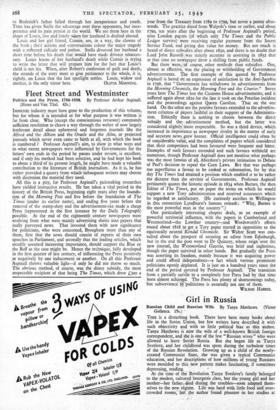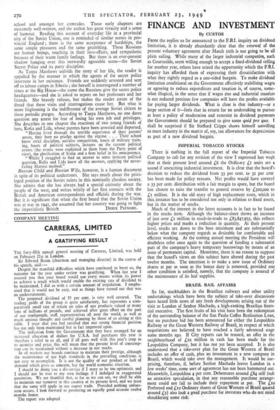Girl in Russia
Russian Child and Russian Wife. By Tanya Matthews. (Victor Gollancz. 15s.) Tins is a disturbing book. There have been many books about life in the Soviet Union, but few writers have described it with such objectivity and with so little political bias as thus author. Tanya Matthews is now the wife of a well-known British foreign correspondent, and she is one of the few " Russian wives " who were allowed to . leave Soviet Russia. But she began life as Tanya Svetlova, and her childhood was spent during the turbulent times of the Russian Revolution. Growing up as a child of the newly- created Communist State, she was given a typical Communist education, and her descriptions of how millions of young Russians were moulded to this new pattern makes fascinating, if sometimes depressing, reading.
At the time of the Revolution Tanya Svetlova's family belonged to the modest, cultured bourgeois class, but the young girl and her mother—her father, died during the troubles—soon adapted them- selves to the new regime. Life was hard with little food and over- crowded rooms, but the author found pleasure in her studies at school and amongst her comrades. These early chapters are extremely well-written, and the author has great vivacity and a sense of humour. Reading this account of everyday life in a provincial city of the Soviet Union, one is reminded of similar scenes in pro- vincial England ; there is the same acceptance of hardships, the same simple pleasures and the same grumbling. These Russians are human beings, touching in their love-affairs, and sympathetic because of their warm family feelings. But there is an ever-present shadow hanging over this outwardly agreeable scene—the Soviet Secret Police and its party discipline.
As Tanya Matthews unfolds the story of her life, the reader is appalled by the manner in which the agents of the secret police intervene in her existence. Friends are suddenly arrested and sent off to labour camps in Siberia ; she herself is interrogated a number of times at the Big House—the name the Russians give the secret police headquarters—and she is asked to report on her professors and her friends. She bravely refuses, but makes the reader aware of the dread that these visits and interrogations cause her. But what is more frightening is the indifference of the average Soviet citizen to these periodic purges. According to Tanya Matthews, no one dares question any arrest for fear of losing his own job and privileges. She describes in one chapter the reactions of two young friends of hers, Kolia and Lida, whose parents have been arrested and deported. " Having lived through the terrible experience of their parents' arrest, they bore no grudge against the regime.. . . Their school knew strict discipline, socialist competition, hours of military train- ing, hours of political subjects, lectures on the current political events (the events were explained to them from the Party point of view), the glorification of Stalin and a firm belief in his omnipotence. " Whilst I struggled to find an answer to some intricate political question, Kolia and Lida knew all the answers, applying the never- failing Marxist method."
Russian Child and Russian Wife, however, is a human document in spite of its political undertones. She says much about the privi- leged position of the Soviet rulers in this nominally classless society. She admits that she has always had a special curiosity about the people of the west, and writes wittily of her first contacts with the British and American correspondents and officials during the war. But it is significant that when she first heard that the Soviet Union was at war in 1941, she assumed that her country was going to fight



































 Previous page
Previous page